World’s 1st all electric tugboat now at work in Istanbul
A harbour port near Istanbul is home to the world’s 1st fully operational all electric tugboat, which is expected to prevent the emission of 210 tonnes of CO2 and nine tonnes of NOx (nitric oxide and nitrogen dioxide) in its first year of work (when compared to the exhaust from a similarly sized diesel tug).
The tug, named ‘Gisas Power‘, was built by ZEETUG – Zero Emission Electric Tug boat – with design by Navtek Naval Technologies. It is owned by GISAS Shipbuilding and works in the Port of Tuzla Aydınlı Bay, which has both environmental and navigational restraints that the all electric solution was designed to address.
All electric tugboat chosen over hybrid system
Gisas asked Navtek for harbour tugs with both “lower emission and smaller size” than its previous fleet. When the boat was first commissioned, in 2018, Navtek’s Vice Chairman said: “The tug will work in a very narrow and tight environment, which is why we opted for a fully electric, battery-powered propulsion system rather than a hybrid solution.”
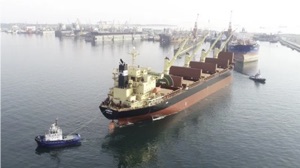 The Gisas Power has an overall length of 18.7 metres • 61 feet, a beam of 6.7m • 22′ and 32 tonnes of bollard pull (BP), which is how the power of tugboats is rated. Different tugboats are designed for different jobs, but the ‘average’ tug has a BP rating of about 40-45 tonnes and the strongest are rated at 60-65T BP.
The Gisas Power has an overall length of 18.7 metres • 61 feet, a beam of 6.7m • 22′ and 32 tonnes of bollard pull (BP), which is how the power of tugboats is rated. Different tugboats are designed for different jobs, but the ‘average’ tug has a BP rating of about 40-45 tonnes and the strongest are rated at 60-65T BP.
The ZEETUG integrated electrical propulsion system has been designed in a modular way to address that variety of uses. Boats can be tailored to a client’s specific operation profile from 5T BP to 75T BP.
Two 1,450kWh li-ion battery packs for full day’s work
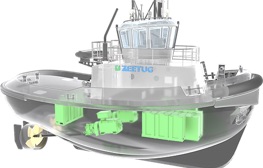 This first model, the ZEETUG-30, draws all its power from two 1,450kWh lithium-ion battery packs, in the Orca energy storage system (ESS) from Corvus Energy. For safety, the tug has two extra battery rooms, one forward and one aft, both maintained at a constant temperature by an air cooling system.
This first model, the ZEETUG-30, draws all its power from two 1,450kWh lithium-ion battery packs, in the Orca energy storage system (ESS) from Corvus Energy. For safety, the tug has two extra battery rooms, one forward and one aft, both maintained at a constant temperature by an air cooling system.
The tugboat has been designed to operate for a full day on a single charge, which comes from a land-based quick charge station (QCS) also designed and built by Navtek.
The entire system is monitored by Navtek’s Smart Tug Energy Management System (STEMS) with software that tracks tug speed, motor speed, power consumption, battery-motor temperature and battery state of charge, providing feedback and suggested actions to the captain.
Lots more electric tugs on the way…
Electric motors are the perfect propulsion system for certain tugboats, because they can generate a lot of power instantaneously and at low speeds. They also provide major savings on fuel, which is the second biggest expense for tugs after personnel. Maintenance expenses are also much lower.
An all electric tugboat is not right for every application, so electric motors are often combined with diesel engines, – either in a hybrid system or operating separately as steering thrusters. That provides some environmental and cost advantages for tugs that can’t have access to daily charging.
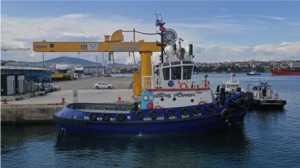
Having said that, the ZEETUG-30 is the first all electric tugboat in operation right now, but not the only one in the works. Holland’s Damen Shipyards and Swedish battery/fuel cell producer Echandia have announced a partnership that will focus on the global tugboat market. They are building the 70T BP all electric tug for the Port of Auckland, New Zealand that we wrote about last August.
…even hydrogen tugs
Then there is hydrogen. E5Lab and Tokyo Kisen, Japan’s largest tugboat manufacturer, have plans for two hybrid tugs – not diesel’electric, but battery/hydrogen fuel cell – that will be deployed in Yokoshima and Kawasakki. And we wrote last March about Switzerland’s ABB and Canada’s Ballard Systems collaborating on the world’s first hydrogen powered river boat, with hydrogen for the fuel cells sourced from renewables for a totally zero emission energy chain.
So one day the stench of diesel tugs huffing and puffing away in harbours and ports will be a thing of the past. It wont be any time soon, because tugboats are designed to have very long lives. But Gisas has already ordered two more ZEETUGs, one with a 30 tonnes bollard pull and another with 45 and construction is underway.

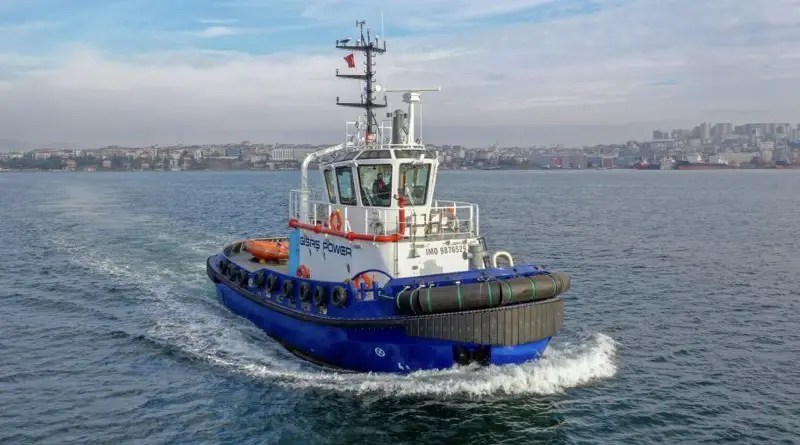
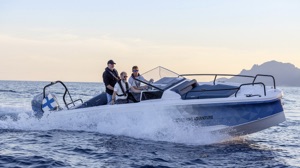
Batteries are rated in kWh, not kW.
This is a great first endeavor, hoping we will see more very soon. Hydrogen versions are just gigantic wastes of energy and expensive
You’re right. I took this kW from the press release without looking at it. Fixed now. Thx!